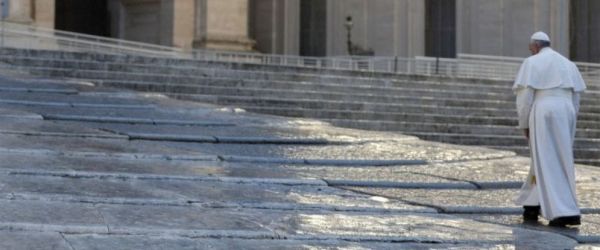Man is God's surname: the Lord in fact takes the name from each of us - whether we are saints or sinners - to make it his own surname. For in becoming incarnate, the Lord made history with humanity: his joy was to share his life with us, 'and this makes one weep: so much love, so much tenderness'.
It was with thoughts turned to the now imminent Christmas that Pope Francis commented on Tuesday 17 December on the two readings proposed by the liturgy of the word, taken respectively from Genesis (49:2, 8-10) and the Gospel of Matthew (1:1-17). On the day of his 77th birthday, the Holy Father presided over morning Mass as usual in the chapel of Santa Marta. Concelebrating among others was Cardinal Dean Angelo Sodano, who expressed the best wishes of the entire College of Cardinals to him.
In his homily, which focused on the presence of God in the history of humanity, the Bishop of Rome identified two terms - inheritance and genealogy - as the keys to interpreting the first reading (concerning the prophecy of Jacob gathering his sons and predicting a glorious descent for Judah) and the Gospel passage containing the genealogy of Jesus. Focusing in particular on the latter, he emphasised that it is not 'a telephone book', but 'an important subject: it is pure history', because 'God sent his son' among men. And, he added, 'Jesus is consubstantial with his father, God; but he is also consubstantial with his mother, a woman. And this is that consubstantiality of the mother: God made himself history, God wanted to make himself history. He is with us. He has made a journey with us'.
A journey,' continued the bishop of Rome, 'that began from afar, in Paradise, immediately after original sin. From that moment, in fact, the Lord 'had this idea: to make a journey with us'. Therefore, 'he called Abraham, the first one named in this list, and invited him to walk. And Abraham began that journey: he begat Isaac, and Isaac Jacob, and Jacob Judah'. And so on through human history. God walks with his people', therefore, because 'he did not want to come to save us without history; he wanted to make history with us'.
A history, said the Pontiff, made of holiness and sin, because in the list of Jesus' genealogy there are saints and sinners. Among the former the Pope recalled 'our father Abraham' and 'David, who after sin converted'. Among the latter, he singled out "high-level sinners, who did big sins", but with whom God equally "made history". Sinners who failed to respond to the plan God had imagined for them: like 'Solomon, so great and intelligent, who ended up as a poor man who did not even know his name'. Yet, Pope Francis noted, God was also with him. "And this is the beauty of it: God makes history with us. Moreover, when God wants to say who he is, he says: I am the God of Abraham, of Isaac, of Jacob'.
That is why to the question "what is God's surname?" for Pope Francis it is possible to answer: "It is us, each one of us. He takes the name from us to make it his surname'. And in the example offered by the Pontiff there are not only the fathers of our faith, but also ordinary people. "I am the God of Abraham, of Isaac, of Jacob, of Pedro, of Marietta, of Armony, of Marisa, of Simon, of everyone. He takes the surname from us. God's surname is each one of us,' he explained.
Hence the realisation that by taking 'the surname from our name, God has made history with us'; indeed, more than that: 'He has allowed himself to write history with us'. And we still continue to write 'this history', which is made 'of grace and sin', while the Lord does not tire of coming after us: 'this is God's humility, God's patience, God's love'. Moreover, even 'the book of Wisdom says that the joy of the Lord is among the children of man, with us'.
This is why 'as Christmas approaches', it came naturally to Pope Francis - as he himself confided in concluding his reflection - to think: 'If he made his history with us, if he took his last name from us, if he let us write his history', we for our part should let God write ours. Because, he clarified, 'holiness' is precisely 'letting the Lord write our story'. And this is the Christmas wish that the Pontiff wanted to make 'for all of us'. A wish that is an invitation to open our hearts: "Let the Lord write history for you and let him write it for you."
[Pope Francis, S. Marta homily, in L'Osservatore Romano 18/12/2013]












